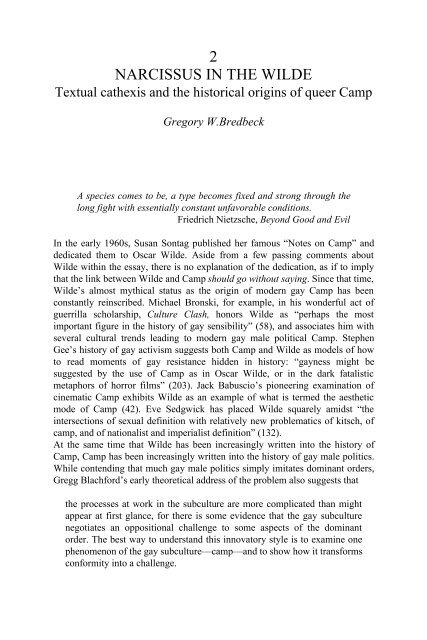Edited by Moe Meyer - Get a Free Blog
Edited by Moe Meyer - Get a Free Blog
Edited by Moe Meyer - Get a Free Blog
You also want an ePaper? Increase the reach of your titles
YUMPU automatically turns print PDFs into web optimized ePapers that Google loves.
2<br />
NARCISSUS IN THE WILDE<br />
Textual cathexis and the historical origins of queer Camp<br />
Gregory W.Bredbeck<br />
A species comes to be, a type becomes fixed and strong through the<br />
long fight with essentially constant unfavorable conditions.<br />
Friedrich Nietzsche, Beyond Good and Evil<br />
In the early 1960s, Susan Sontag published her famous “Notes on Camp” and<br />
dedicated them to Oscar Wilde. Aside from a few passing comments about<br />
Wilde within the essay, there is no explanation of the dedication, as if to imply<br />
that the link between Wilde and Camp should go without saying. Since that time,<br />
Wilde’s almost mythical status as the origin of modern gay Camp has been<br />
constantly reinscribed. Michael Bronski, for example, in his wonderful act of<br />
guerrilla scholarship, Culture Clash, honors Wilde as “perhaps the most<br />
important figure in the history of gay sensibility” (58), and associates him with<br />
several cultural trends leading to modern gay male political Camp. Stephen<br />
Gee’s history of gay activism suggests both Camp and Wilde as models of how<br />
to read moments of gay resistance hidden in history: “gayness might be<br />
suggested <strong>by</strong> the use of Camp as in Oscar Wilde, or in the dark fatalistic<br />
metaphors of horror films” (203). Jack Babuscio’s pioneering examination of<br />
cinematic Camp exhibits Wilde as an example of what is termed the aesthetic<br />
mode of Camp (42). Eve Sedgwick has placed Wilde squarely amidst “the<br />
intersections of sexual definition with relatively new problematics of kitsch, of<br />
camp, and of nationalist and imperialist definition” (132).<br />
At the same time that Wilde has been increasingly written into the history of<br />
Camp, Camp has been increasingly written into the history of gay male politics.<br />
While contending that much gay male politics simply imitates dominant orders,<br />
Gregg Blachford’s early theoretical address of the problem also suggests that<br />
the processes at work in the subculture are more complicated than might<br />
appear at first glance, for there is some evidence that the gay subculture<br />
negotiates an oppositional challenge to some aspects of the dominant<br />
order. The best way to understand this innovatory style is to examine one<br />
phenomenon of the gay subculture—camp—and to show how it transforms<br />
conformity into a challenge.


